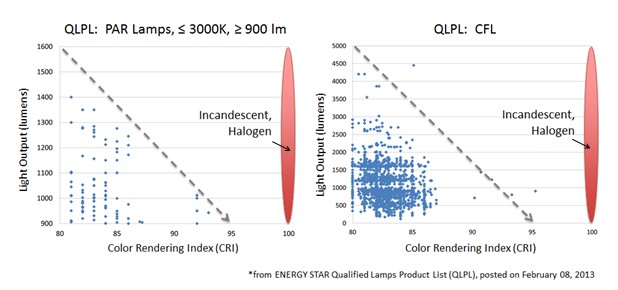Company Asks EPA Not to Repeat Mistakes of Compact Fluorescent Lamps(CFLs)
To ensure the long-term success and widespread market adoption of LED lamps, Soraa late last week urged the U.S. Environmental Protection Agency’s (EPA) ENERGY STAR program to address light quality, specifically color rendering, in its new lamp specification. Supportfor higher color rendering has been expressed bythe California Lighting Technology Center;Profs. Shuji Nakamura and Steven DenBaars; the International Association of Lighting Designers (IALD); Northeast Utilities Companies (NSTAR); and lighting designer Chip Israel; who all filed formal comments on EPA’s Draft 3product specification for LED lamps.
“Poor light quality ruined many consumers’ confidence in compact fluorescents,” said Mike Krames, CTO of Soraa. “The ENERGY STAR qualification must be associated with LED lamps that provide a better quality of light; otherwise, the program will start to lack credibility with end-users and the low adoption rate history of CFLs will be repeated by LED lamps.”
In comments filed with the EPA on May 17th, Soraa told EPA that while ENERGY STAR is not a mandatory standard; the Agency must recognize that it has become a de facto standard for utility rebate dollars critical to lowering the initial cost of LED products. In absence of a second high color rendering index (CRI) tier, it is likely that, similar to the historical situation with CFLs, the vast majority of lamp products will be engineered to perform close to the lower boundaries of quality requirements as set in theENERGY STAR lamp specification for cost reasons (see Figure). Left unaddressed, this lack of high color quality lighting products will lead to a stalling in consumer adoption of energy efficient lighting technology, similar to what has been observed to date with CFLs.

Light output vs. color rendering index (CRI) for both PAR Lamps (left) and CFL (right) from the ENERGY STAR® Qualified Lighting Product List (QLPL), compared to conventional light sources which consumers have become accustomed to over many decades (red ovals). The current standards drive the industry to predominantly produce modest color quality lamps, which do not address the color quality barrier to adoption.
“To persuade consumers to purchase LEDs instead of incandescent lamps, LED lamps must be seen as high-quality products worth the initial higher price differential. Therefore, LED lamps must closely replicate the color rendering of the incandescent and halogen lamps that they replace,” said Ravi Parikh, Energy Services Specialist at Burlington Electric in Vermont. “The SORAA VIVID is such a product, providing superior color quality while improving energy efficiency. As a utility, we are always willing to consider higher incentives for projects utilizing lamps such as SORAA’s. We want to ensure customer satisfaction by reduced energy bills and maintained—if not, improved—quality of light. There is no need to sacrifice quality for efficiency. It is critical we understand the value in both.”
To provide a more balanced portfolio of ENERGY STAR lamp products on the market and mitigate color quality as a barrier to wider adoption of energy efficient lighting products, Soraa proposed to the EPA a second high CRI tier with differential efficacy requirements taking into account the inherent lumen per watt trade-off as a function of CRI for phosphor converted white LEDs. Soraa proposed to keep the existing minimum efficacy requirements, but raise the color quality to a minimum CRI 90. For lamps with CRI between 80 and 90, Soraa proposes to increase the luminous efficacy requirements.
Adoption of Soraa’s proposal will increase overall energy savings through enhanced adoption of higher light quality lamps as well as through higher energy efficiency in lamps of modest light quality.





 CN
TW
EN
CN
TW
EN






